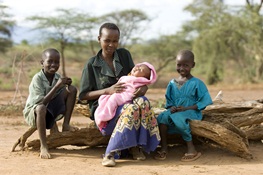Next EDCTP programme to continue delivering life-saving solutions for sub-Saharan Africa

Related topics
Health Innovation Health, Demographic Change and Wellbeing Austria Belgium Denmark France Germany Greece Ireland Italy Luxembourg Netherlands Portugal Spain Sweden United Kingdom Switzerland Norwaydate: 19/09/2014
Project: European and Developing Countries Clinic...
acronym: EDCTP
See also: EDCTP
Contact: Contact
Moreover, EDCTP improved the ethics and regulatory environment by strengthening ethics review capacity and national regulatory authorities in many African countries. EDCTP was the main funder of the African initiative to establish the Pan African Clinical Trials Registry (www.pactr.org), which is now an official WHO Primary Clinical Trials Registry.
The programme has been hugely successful. Under EDCTP1 (2003-2012), a total of 254 projects were financially supported by EDCTP promoting African-European and notably trans-African research partnerships. The projects included 100 clinical trials: 30 on HIV/AIDS, 27 on tuberculosis (TB), 9 on HIV/TB co-infection and 34 on malaria. While 73 clinical trials are still on-going, positive results have been achieved.
While most clinical trials are still on-going, positive results have been achieved. A study of highly active antiretroviral therapy during pregnancy and breastfeeding, for example, demonstrated a 43 per cent reduction in HIV infections in infants and more than 50 per cent reduction of mother-to-child transmission during breastfeeding.
A malaria trial (4ABC) was conducted at 12 centres in seven sub-Saharan African countries (Burkina Faso, Gabon, Mozambique, Nigeria, Rwanda, Uganda and Zambia). More than 10,000 children between 6 and 59 months old were screened, and a total of 4116 children were included in the study and treated. Three novel artemisinin-based combination drugs were found to be safe and effective in treating children with a certain type of malaria.
A project examining severe malaria in children has also been successful, demonstrating that three doses of intravenous artesunate (a drug to treat malaria) over two days is as effective as five doses over three days. This finding has the potential to lower costs and reduce the risk of complications or incomplete treatment. A follow-up clinical study aims to further optimise the administration of the drug.
EDCTP1 has also provided 514 career and training awards to African scientists, including 56 career development and senior fellowships. Almost all senior fellows continued working in their respective countries after the expiration of the grant. More than 1300 research collaborators in Africa and almost 800 in Europe have cooperated so far in EDCTP-funded activities.
Building on the success of the first phase the scope of the EDCTP2 programme may be expanded. This would allow EDCTP to also support clinical trials on other poverty-related diseases – such as neglected infectious diseases like sleeping sickness – at any stage of clinical development, including costly marketing authorisation trials for new vaccines or drugs, and to foster optimised delivery of better health solutions for the specific population groups in need.
In order to prepare for EDCTP2, the Commission has a dedicated FP7 Support action known as EDCTP-Plus. Its activities are laying the foundation for implementing and managing the EDCTP2 programme in view of the proposed expansion and increased budget.
The EDCTP was created in 2003 as a European response to the global health crisis caused by the three main poverty-related diseases of HIV/AIDS, tuberculosis and malaria. Notwithstanding progress made, these three diseases accounted for over 3.5 million deaths in 2012, with the greatest burden of disease in sub-Saharan Africa, where besides ravaging lives, they impede development and cause poverty.
The EDCTP Association currently unites 11 African countries and 13 European countries as full members. Its governance involves representatives of these European and African countries. Mali, Burkina Faso, Sweden and Switzerland are about to join the EDCTP Association as well. The programme is co-funded mainly by these European and African member countries and the European Union while some co-funding is also provided by third parties, such as the Bill & Melinda Gates Foundation, the Calouste Gulbenkian Foundation and pharmaceutical industries.
Check also our publication Investing in European success - EU-Africa cooperation in science, technology and innovation
